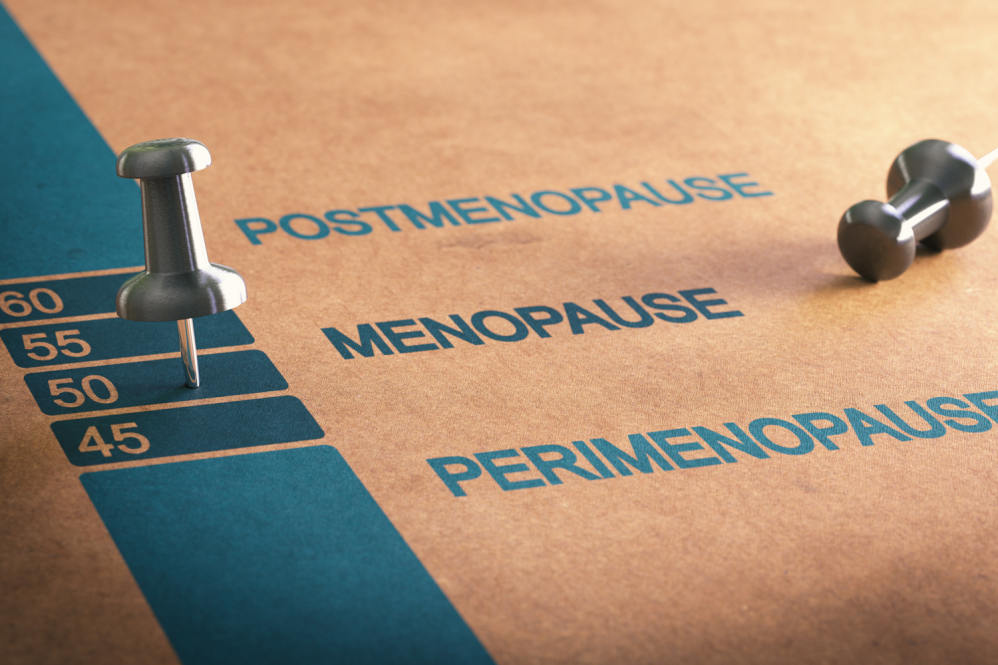During Women's Health month we spoke with Dr. Maryanne McDonnell, OB/GYN at UConn Health to shed some light on the topic of Menopause.

Menopause transition is a natural part of a women's life that is overwhelmingly viewed as taboo and stigmatized as it is associated with aging. Many suffer because they are embarrassed to talk about it and think they have to suffer with the side effects. But this isn't true, there is help available.
During Women's Health month we spoke with Dr. Maryanne McDonnell, OB/GYN UConn Health to shed some light on this topic:
What are the stages of menopause?
Menopause is divided into three basic stages: perimenopause, menopause, and post menopause. During this time, ovarian function first decreases and then finally stops the production of the hormones that stimulate the menstrual cycle; estrogen and progesterone.
Tell us about perimenopause, when does it start and what are the symptoms?
Perimenopause is the time which your body makes the natural transition to menopause, when women start to have symptoms and will notice changes in their menstrual cycles. It starts at different ages; the majority of women start in their 40s and it can last anywhere from six-to-eight years on average.
Perimenopause symptoms may include menstrual changes, mood changes, changes in sexual desire, depression, trouble concentrating, headaches, night sweats, hot flashes, and trouble with sleep.
Most perimenopause symptoms are manageable. But if you need help managing symptoms, medications and other treatments are available. Perimenopause ends when you've had no period for a full year.
What is menopause and when does it happen?
Menopause is a natural process that occurs when a woman's ovaries stop releasing eggs and stops producing estrogen and progesterone. It marks the end of menstrual cycles and is diagnosed after you have gone one year without a menstrual period.
Menopause usually happens between the ages of 45 and 55, but the average age is 51. It can happen earlier or later in some women.
Some women experience no symptoms, while others may experience a combination of symptoms. These can be similar to perimenopause including hot flashes, night sweats, menstrual changes, vaginal dryness, sleep issues, mood changes, decreased libido, weight gain and difficulty concentrating. These symptoms can sometimes last for years after menopause.
A medical professional can help manage menopause symptoms and may prescribe hormone therapy in some cases.
What does the last stage, post menopause entail?
Post menopause is the final stage of menopause and begins after a woman hasn't had a period for 12 months in a row. During post menopause, the body learns to function with lower hormone levels, and reproductive years are over. You will no longer have periods but some women do continue to experience symptoms of menopause.
What are the treatments for the symptoms of menopause?
Menopause symptoms and treatment options vary, and treatments include hormonal therapy, non-hormonal medications, and lifestyle changes. The goal is to decrease symptoms to allow for better quality of life.
Hormone replacement therapy (HRT) - estrogen can help by replacing a small amount of the hormone lost at the time of Menopause. It can help with hot flashes, night sweats, and other side effects of menopause. When a patient is taking estrogen and still has a uterus, progesterone is added to prevent uterine cancer.
Antidepressants- Low doses of some types of antidepressants may help relieve certain menopause symptoms like hot flashes, night sweats, mood changes.
Gabapentin – a drug that is sometimes prescribed off-label to reduce hot flashes during menopause. Instead of affecting hormones, experts think it may act on the hypothalamus, the part of the brain that regulates body temperature.
Treatments for vaginal dryness – Postmenopausal vaginal dryness can cause pain during intercourse and/or recurrent urinary tract infections. There are several treatment options for vaginal dryness. Some, such as vaginal moisturizers or lubricants, are available without a prescription. Others require a prescription; these include a vaginal estrogen cream, tablet, capsule, or ring; an oral medication called ospemifene; and a non-estrogen vaginal tablet called Prasterone.
Lifestyle changes include wearing layers of clothing, keeping your bedroom cool at night, taking a cool shower, use a fan, try to reduce your stress level, avoid, or reduce potential triggers, such as spicy food, caffeine, hot drinks, smoking and alcohol, exercise regularly, and lose weight if you're overweight.
Eating a nutritious diet rich in fruits, vegetables, and protein, among other nutrients, and getting regular physical activity may provide relief from menopause symptoms.
There are many supplements and products on the internet and social media that claim to help with symptoms of menopause. Do these really help?
We must remember that supplements and many of the products sold online are not regulated by the FDA and have not been researched enough to confirm their effectiveness or safety.
Patients should talk to their doctor before taking any type of supplement to determine it is safe.
For those looking for natural ways to control symptoms, eating a nutritious diet rich in fruits, vegetables, and protein, among other nutrients, and getting regular physical activity may provide relief from menopause symptoms.
Dr. McDonnell recommends women suffering from symptoms that may or may not be linked to menopause speak to their health-care provider. "You can get help with many of these symptoms you are experiencing and there is no need to do it alone".
It's important to know that there isn't a one-size-fits-all approach to symptoms or treatments, but working with your practitioner, you can find one that works for you.
The Women's Center at UConn Health offers OB/GYN services for women at every stage of their lives, providing access to award-winning doctors at a location that's close to home. Keeping our patients in mind, we've brought together general obstetrics and gynecology with specialized services and imaging, making appointments even more convenient.






